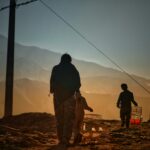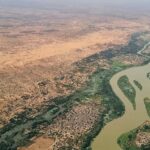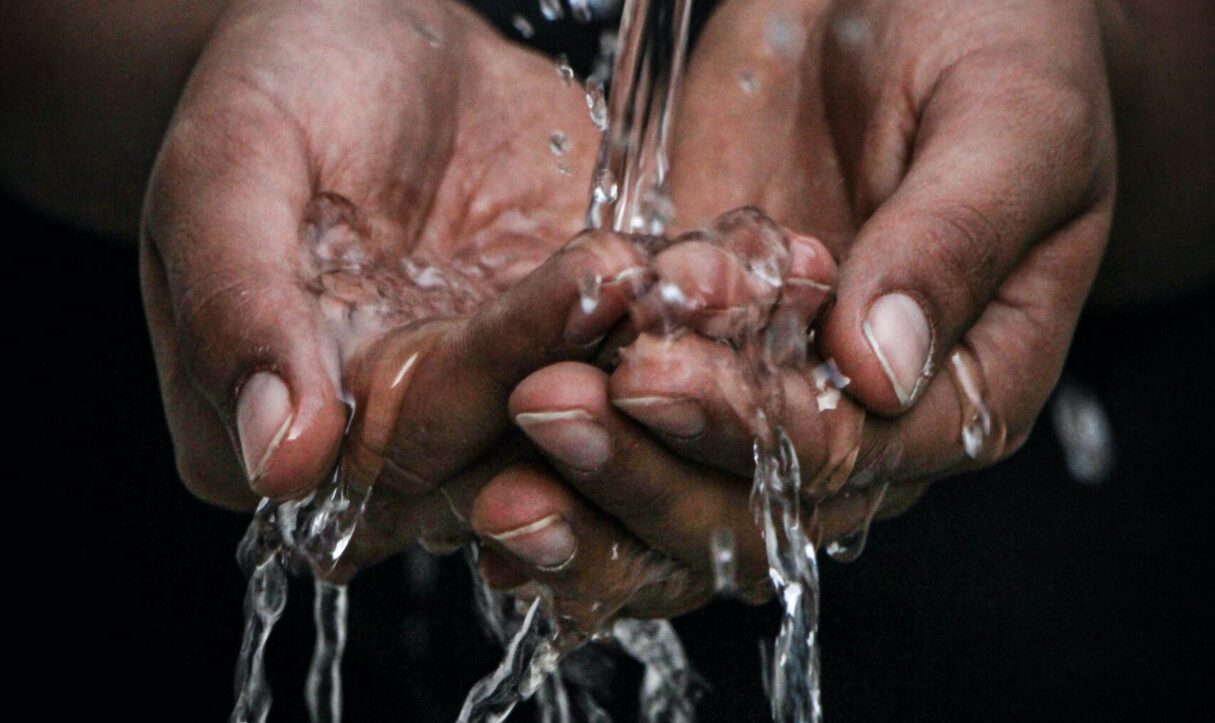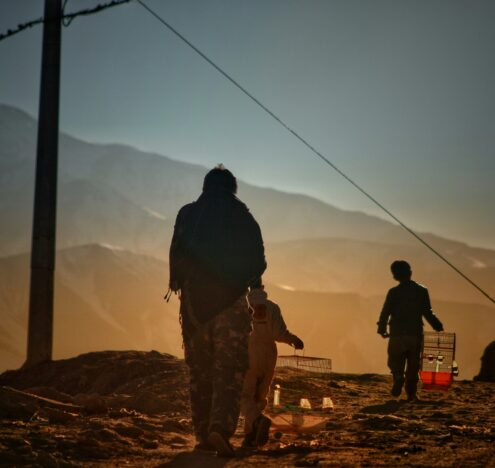Goal 6 of the UN Sustainable Development Goals seeks to “Ensure availability and sustainable management of water and sanitation for all” by 2030. Yet, the generalized aims outlined by this goal do not take into consideration how colonialism has systematically dispossessed Indigenous people of their land and natural resources. It overlooks the glaring issue of water theft, which comes in several forms, such as illegal extraction, the diversion of water from rivers, the theft of groundwater by private companies selling bottled water, damage to water resources like glaciers by mining companies, and agriculture that is estimated to contribute up to 70% of water theft globally.
The Palestinians and the Indigenous Mapuche people of Chile are two populations that face extreme levels of water theft. For these groups and others, water theft is directly linked to settler-colonialism and neoliberal policies. Both Indigenous populations have experienced dispossession and the altering of their terrain. And both groups have responded with anti-colonial resistance to counter land and water theft.
Without addressing underlying colonial violence, Goal 6 of the UN Sustainable Development Goals is doomed to fail. However, decolonization activism by the Mapuche and the Palestinians may have lessons that reach beyond their communities, and if we follow their lead, we might find answers to one of our most pressing global issues.
From the Occupation of Araucania to the Neoliberal Experiment in Chile
The Mapuche have accused Argentina and Chile of acts of genocide at the International Criminal Court. They seek retribution for the slaughter of their communityand the seizure of their territory between 1861 and 1883, a period that the colonial framework narrates as the “Pacification of Araucania.”
Chile achieved independence from the Spanish colonists in February 1818. In 1859, the Chilean state began occupying Indigenous land through land acquisition — a plan that had been concocted by Senator Mariano Egana Fabres in 1823. As settler presence around the Biobío River increased, the Mapuche organized an uprising against the settlers in 1859, prompting further action by the Chilean state against the Indigenous population. The Mapuche had already resisted Spanish colonization, but in 1869, they faced a military massacre that resulted in thousands dead and the colonization of the Araucania region, with 90% of Indigenous land usurped by the Chilean state.
In the 1920s, the Chilean government transferred approximately 100,000 hectares of Indigenous land to agricultural businesses. From 1962 until 1973, Chilean governments embarked on land reform to restore state-expropriated territory back to the Mapuche. In 1972, Salvador Allende’s Popular Unity Government sought protection of Mapuche land ownership through Indigenous Law No. 17,729. When the US-backed dictatorship of Augusto Pinochet came to power in Chile in 1973, Allende’s reforms — which had restored more than 6.4 million hectares back to the Indigenous — were rolled back, and Mapuche territory was once again expropriated, this time paving the way for the neoliberal experiment in Chile.
Israel’s Settler-Colonial Enterprise in Palestine
Established in 1907 in the UK, the Jewish National Fund (JNF) was created by the World Zionist Organization to acquire land for Jewish settler colonies, stepping up land purchases in Palestine during the British Mandate between 1920 and 1948. After the 1948 Nakba, the JNF was involved in the expropriation of Palestinian towns and villages that were ethnically cleansed, with residents massacred or forcibly displaced by Zionist paramilitaries. The prevention of the return of Palestinians to their villages was further enforced by Israel in 1950 through the Absentee Property Law.
The Zionist movement, meanwhile, relied on the Kibbutz, which contributed to agricultural Jewish settlements on Palestinian territory and facilitated the appropriation of Palestinian agricultural land.
The JNF’s activities in Palestine were indirectly supported at the UN through diplomatic support for the 1947 Partition Plan, and through the promotion of colonial frameworks particularly by the Guatemalan representative to the UN Jorge García-Granados, who declared Jewish culture to be superior to Arab culture. “A million progressive human beings should not be the plaything of a few ringleaders supported by millions of human beings of less advanced ideas,” he stated, reflecting the Spanish colonial context of Guatemala, which subjugated the Indigenous Guatemalan majority.
This year, marking 75 years since Israel’s establishment, the President of the European Commission Ursula von der Leyen repeated the Zionist myth that contributed to the establishment of the settler-colonial enterprise in Palestine. “You have literally made the desert bloom,” von der Leyen stated in a video message.
Neoliberalism Guiding Chile’s Water Theft
Extractive businesses profited under Pinochet’s dictatorship and continued to thrive with the Chilean transition to democracy. In 1974, for example, the community in Curanilahue was dispossessed of their land to pave the way for Forestal Arauco’s forestry business, a public company that was privatized in 1974 during the dictatorship. Agriculture, forestry, and mining have all contributed to the depletion of natural resources, water toxicity, and water theft in Indigenous territories.
As the forestry industry expanded in Chile over the decades to become the third largest economic sector, with pine and eucalyptus plantations taking over the country’s native flora, water depletion became a permanent concern for the Mapuche. The introduction of non-native species of trees to the local ecosystem altered Chile’s landscape, drying up water springs and streams and even contributing to fires in the country due to the density of forest plantations.
For decolonization to take root, the UN needs to recognize and integrate the Indigenous relationship to land, which is based upon preservation rather than exploitation.
Lack of potable water also affected the Mapuche’s everyday lives. Already facing poverty at home, school children could no longer rely on the school’s supply of water for the day. “Today the pupils have to come to school bringing their water. Besides the risk this poses to health, this is a great burden, as most of them suffer from the same problem at home,” a school director in Quetrahue, Lumako, said.
The Chilean dictatorship privatized water in 1980, making water rights separate from land ownership. The forestry and agricultural sector holds 77% of water rights in Chile, followed by 13% held by mining companies. In 2014, then Chilean President Michelle Bachelet sought modification of the existing water appropriation and proposed “recognizing water as a national good for public use,” yet met with opposition from the hydroelectric, agricultural, and mining lobbies.
Bachelet’s modification, however, would not have repealed individual private ownership of water. The latter was an issue that then Chilean President Sebastián Piñera sought to strengthen in 2018, protecting some of his ministers who have water ownership rights — the most prominent being Antonio Walker Prieto who, through the agricultural company founded with his father, has access to more than 29,000 liters of water per second.
Water Deprivation as Colonial Violence
While the British Mandate had already kickstarted the foundations for Israel’s later water theft by drawing up hydraulic plans to exploit the Jordan River and its tributaries, in 1949 Israel nationalized the country’s water for its colonial enterprise, thus rendering Palestinians beggars for a basic right. In June 1967, following the Six-Day War and Israel’s military occupation of Palestine, the occupied West Bank’s aquifers fell completely under Israeli control.
Coupled with Israel’s control over the Jordan Valley in the occupied West Bank, Israel’s water theft sustains its colonial agricultural businesses and provides water for its settler-colonial communities, which consume 400 to 700 liters per capita daily. Palestinian water consumption is well below the 50-100 liters UN-recommended daily intake — 26 liters is the average consumption among herding communities in the Jordan Valley.
The Oslo Accords ensured that Israel’s water theft continues unabated. In 1993, the Palestinian Liberation Organization (PLO) and Israel signed agreements that many Palestinians argue were to the detriment of the Palestinian people and in favor of diplomatic negotiations with Israel, which, far from paving the way for the two-state paradigm, enabled Israel’s expansion over Palestinian territory to the apartheid level.
Under the Oslo II Accord of 1995, Israel retained control of 80% of water in the occupied West Bank. The Joint Water Committee (JWC), established in the same year, was supposed to be a five-year venture overseeing water resources in the occupied West Bank. However, Palestinians require the JWC’s approval of any water-related projects, which Israel routinely vetoes, thus leaving the Palestinian Authority with no autonomy over water consumption and use. Moreover, the monopoly on water is in the hands of Mekorot, Israel’s national water company, which describes its involvement in Israel’s water economy as providing “for the Israeli people: the family at home, the farmer in the field, the worker in industry.”
Von der Leyen ignored these uncomfortable truths when commenting about Israel making the desert bloom. While Palestinians are deprived of water, Israeli settlements are serviced through Israel’s water grid, and provided irrigation and more than adequate water consumption for basic needs and leisure activities — not to mention agricultural endeavors. Israel has destroyed over 160 Palestinian reservoirs and wells since 2021 under the pretext that Palestinians are illegally extracting water, despite Israel rarely granting permits for Palestinians to legally construct buildings and infrastructure.
Will the UN Recognize the Role of Colonialism in the Current Water Theft?
The Mapuche and the Palestinians continue their Indigenous anti-colonial resistance for land reclamation. Both face increasing militarization aimed at quelling their resistance activities. Israel supplies the Chilean government with military and surveillance technology, which is mostly used against the Mapuche, thus extending the complicity of colonial subjugation. Palestinians meanwhile, especially Palestinians in Gaza, are “collateral damage” in Israel’s quest for complete colonial domination.
For Indigenous communities, land and water are sacred. The Mapuche, for example, have a vast vocabulary relating to different forms of water, and its culture is based on the premise that there is no life without water. Israel’s colonial expansion and the diversion of water to the colonial settlements has negatively impacted the Palestinian people’s agricultural tradition for decades.
If the UN intends to reach Goal 6 of its Sustainable Development Goals, decolonization needs to be at the helm of any strategy. Indigenous populations, in this case the Mapuche and the Palestinian people, have been involved in resistance tactics for territorial liberation and autonomy. In 1965, the UN General Assembly recognized the legitimacy of the anti-colonial struggle, yet the UN is deeply influenced by colonial powers whose states were built upon Indigenous ethnic cleansing and land theft. For decolonization to take root, the UN needs to recognize and integrate the Indigenous relationship to land, which is based upon preservation rather than exploitation. A politics of restoration should prevail.





















